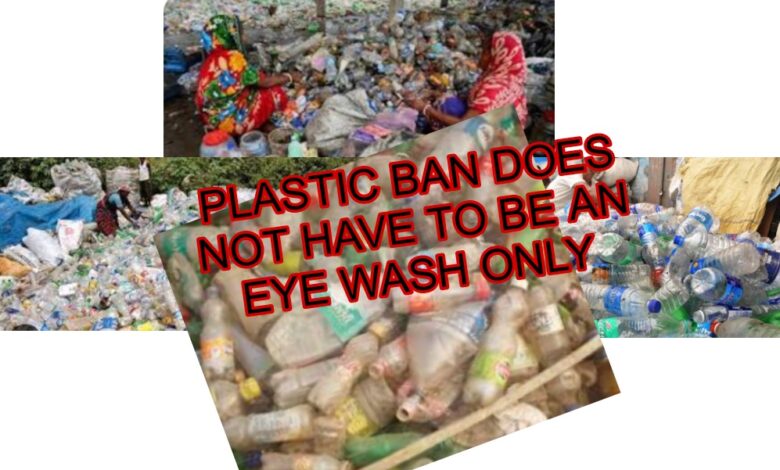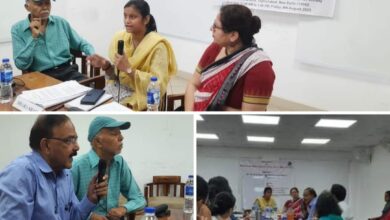PLASTIC BAN DOES NOT HAVE TO BE AN EYE WASH ONLY


We are a little late on the single-use plastic ban, but it is a great beginning.
India banned the manufacture, import, stocking, distribution, sale and use of certain identified single-use plastic items, which have low utility and high littering potential, all across the country from July 1, 2022.
The ban was a part of a federal plan to phase out the ubiquitous material in the country. The
ban came into effect despite companies extensively lobbying with the government to delay the transition, citing costly alternatives and their lack of easy availability.
There have been plastic bans in the past as well. As many as 25 Indian states had banned
plastic previously with some form of state notification within their own jurisdictions. But all these bans had a very limited impact on ground.
Though welcomed by all across the board, the single-use plastic will take many more years to
disappear from the scene, though will remain in the soil for another thousand years. And only if there is a will both in the administration to stop it, and in the people to cooperate.
Plastic was an incidental invention; we were kind of experimenting with things when we
invented plastic and since then it has become a major part of our lives.
Today, we are living in a time, when we have started actually breathing, eating plastic. We are actually living a life full of plastic items.
There have been many global studies that suggest that we have been ingesting 5 grams of plastic every year. And we all know what plastic is made of, so it is putting us all in
tremendous health hazards.
We have come at a stage, where 10-12 years down the line, we might even see another pandemic just because micro plastics are being found in our blood.
Both are yet to be seen, regrettably. Of course, it will take time for it to be effectively
implemented. For the effective implementation of the plastic ban, government authorities
have set up national and state level control rooms. Special enforcement teams have also been formed to check for illegal manufacture, import, stocking, distribution, sale and use of
banned single use plastic items. These bodies work is yet to be seen on the ground.
The present ban is just an eyewash. The share of plastics used for these banned single-use
plastic items is less than 2-3 percent. and the current ban covers only those items which have a low utility and high littering potential. These items are not widely used by large consumer companies and hence will have a limited impact for now.
This despite the fact that India is the fifth highest country in terms of generation of plastic waste, with a discharge of 3.5 million tonnes (FY2020). On a per capita basis, India’s plastic waste generation almost doubled over the last few years.
The India Greens Party (iGP) is rightly of the view that only a total ban on all single-use
plastics will be an effective action. A possible extension of ban to other single-use plastic
items such as sachets, pouches, wrappers and laminated tubes, etc, will bring more relief.
A ban on the use of single-use plastics that was notified by the Ministry of Environment,
Forest and Climate Change in August 2021 came into effect on 1 July this year. The
notification said national and state-level control rooms would be set up to check illegal
manufacture, import, stocking, distribution, sale and use of banned single-use plastic items which include earbuds with plastic sticks, plastic sticks for balloons, plastic flags, candy sticks, ice-cream sticks, polystyrene decoration, plastic plates, cups, glasses, cutlery such as forks, spoons, knives, straws, etc.
The Plastic Waste Management Amendment Rules, 2021, will also prohibit manufacture,
import, stocking, distribution, sale and use of plastic carry bags having thickness less than
120 microns with effect from 31 December 2022.
The official ban has been implemented to bring down the enormous damage single-use
plastic products have on the environment. The list of banned items include: Ear buds with
plastic sticks, plastic sticks for balloons, plastic bags, candy sticks, ice-cream sticks,
polystyrene (thermocol) for decoration, plastic plates, cups, glasses, cutlery such as forks,
spoons, knives, straw, trays, wrapping or packing films around sweet boxes, invitation cards, cigarette packets, plastic or PVC banners less than 100 micron, and stirrers.
In case you’re worried about how to go on about with your day-to-day activities without
plastic items that were earlier essential to your lifestyle, take a look at these easy to find and
affordable alternatives as suggested by World Wide Fund for Nature.
Alternatives to plastic you can easily find: Try stainless steel straws, bamboo straws, pasta
straws and rice straws; instead of balloons, choose more environmental-friendly decorations such as flowers, DIY paper flowers, paper lanterns, recycled bunting; give up plastic ear buds and switch to bamboo cotton buds, or fluid ear washes; take a reusable glass or mug to office or school and save the environment; plastic cutlery is extremely wasteful — try using reusable bamboo utensils or invest in a travel cutlery set; for grocery shopping, carry jute or cloth bags
from home; and get yourself a steel bottle for the long-term instead of a plastic one.
As you take the leap and switch to these eco-friendly options, you’ll find yourself living more
sustainably and happily, knowing that you’re not harming the environment. It is good that the cigarette companies have already migrated to biodegradable plastic wraps and hence may not witness an incremental impact.
Now, if this ban is genuinely enforced, I think it will have an impact. But the problem is that
there is no overall strategy. Basically, this notification means that there is a law which will prohibit certain items for production, sale and consumptions. The enforcement of the ban has been left with the local authorities and municipal bodies. I am a little skeptical about that as I don’t know how much local authorities will be able to do alone as there is no holistic
approach towards the ban.
I haven’t seen any advertisements, newspaper or TV commercials or something on social
media on this ban that will help inform people about this ban taking place in the country.
We have to adopt an inclusive approach otherwise enforcement will be very difficult. We are talking about environment, global warming, climate change – these are non-negotiable.
Government cannot succeed until unless the approach is inclusive. We have to understand
that beating plastic pollution is simply not government’s responsibility – it is the
responsibility of industries, brands, manufacturers and most importantly the consumers.
Finding an alternative to plastic is not easy, but it is necessary to find solutions. We have got
ourselves in a situation where a decision to ban plastic items is non-negotiable.
We all need to follow the 3Rs – Reduce, Reuse and Recycle. In our waste composition – more than half of the waste is food or kitchen waste. In this kitchen waste 70% is water. So,
when we compost water evaporates and leaves behind the substitutes, which can be used for gardening purposes. Today, we spend million and billions of rupees on transporting and dumping the food waste.
Along with the health of people, the campaign has realised the need to also take care of the
health of the eco-system. Our environment is fragile due to human activity, which is not only
over-exploiting available resources, but also generating immense pollution as a result of
using and extracting those resources.
Overcoming the issue of elimination of single-use plastic has become one of the biggest
ecological scourges in the recent times. The policymakers across the globe have initiated
several regulatory policies regarding the elimination of single-use plastics. In the Indian
scenario, although the government became somewhat practical in including provisions in the framework of its legislations but still the implementation is at nascent stage.
Several studies have cited reasons which hinder the elimination of single-use plastics.
The results demonstrate that ‘Lack of manufacturing facilities to meet the demand of
biodegradable single-use products’, ‘Lack of financial support for developing alternatives of
single-use of plastics’, ‘Lack of government initiatives to promote biodegradable single-use
products’ and ‘High cost for technologies for alternative of single-use of plastics’ are the
most significant barriers in Indian scenario.
Thus, it is clear from the study that the advertising of products with the use of single-use plastics does not help in eliminating or changing consumer behaviour.
Moreover, the dependence of customers over the plastic bag remains the same because it is
light, flexible, and most importantly leak-proof and water-resistant.
Thus, the government needs to take strong steps in giving financial support and
recommendation to form the strategic regulation committee to monitor the issue.
Alternative sources of bags also need to be made available to reduce the reliance on single – use plastic bags. The finding of the study is expected to create a single-use plastic-free
environment.
Based on the understanding through the conduct of the study, the essential policy measures and recommendations were proposed to assist policymakers of government bodies.
( The writer is senior journalist, views in the article are his personal)





